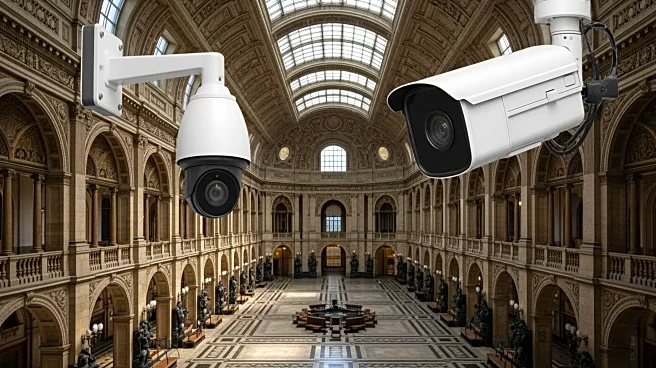What's Happening?
The Louvre Museum in Paris has been urged by France's court of auditors to expedite its security modernization plans following a jewel heist that occurred on October 19. The heist involved the theft of Crown
Jewels valued at $102 million, executed by thieves using a truck-mounted basket lift to access a window of the Apollo Gallery. The court's report, covering the period from 2018 to 2024, criticized the museum for prioritizing visible and attractive operations over essential safety and security systems. Despite plans to modernize security equipment being studied since 2018, implementation has been delayed, with technical work scheduled to start next year and complete by 2032. The report highlighted that outdated security systems, rather than a lack of staff, facilitated the heist.
Why It's Important?
The Louvre Museum's security shortcomings have significant implications for cultural heritage preservation and public trust in museum security worldwide. The theft of such valuable artifacts underscores the need for robust security measures in high-profile institutions. The court of auditors' recommendations aim to redirect resources towards enhancing security, potentially influencing similar institutions to reassess their security priorities. The incident also raises concerns about the adequacy of current security protocols in protecting priceless cultural assets, which could lead to increased scrutiny and reforms in museum security practices globally.
What's Next?
In response to the audit, the Louvre has expressed regret that the report did not consider the impact of the Covid pandemic and the upcoming 2024 Paris Olympics on decision-making. The museum agrees with most recommendations and has already proposed similar measures. The 'Louvre New Renaissance' plan, launched earlier this year, includes security improvements and is estimated to cost up to 800 million euros. Culture Minister Rachida Dati announced that anti-ramming and anti-intrusion devices will be installed in the next two months, following an investigation into the theft risk at the museum.
Beyond the Headlines
The Louvre heist highlights broader issues of governance and resource allocation within cultural institutions. The court of auditors identified four failings: underestimated risk, underequipped security, ill-suited governance, and obsolete protocols. These findings suggest a need for systemic changes in how museums manage security and prioritize investments. The incident may prompt discussions on balancing the acquisition of new art pieces with the maintenance of existing collections and infrastructure, potentially leading to a shift in how cultural institutions allocate their budgets.









